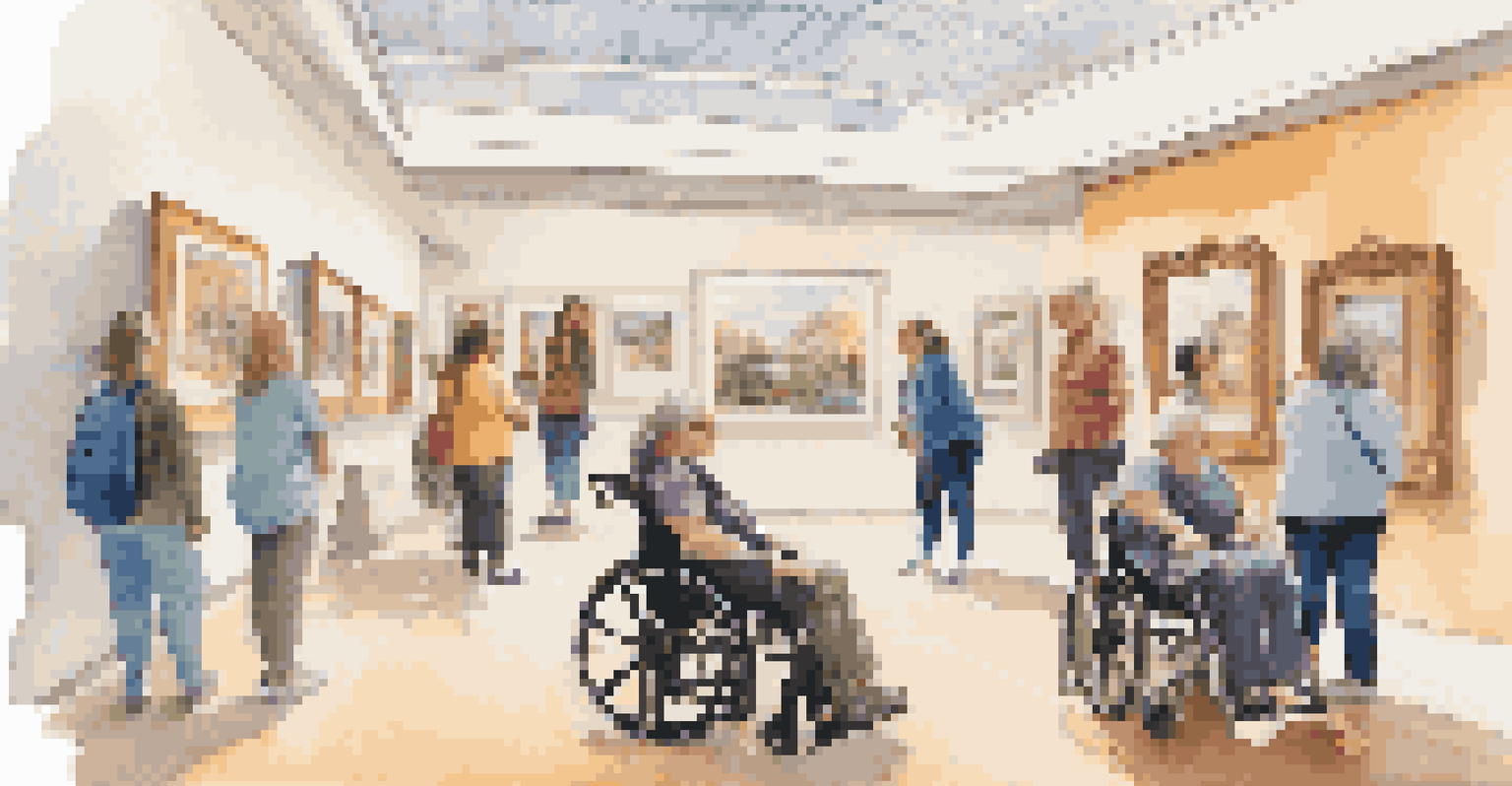Accessible Tours: Finding the Right Experiences for You

Understanding Accessible Tours and Their Importance
Accessible tours are specially designed experiences that cater to individuals with varying needs, ensuring everyone can enjoy travel. These tours often consider mobility challenges, sensory impairments, and other specific requirements. The importance of these tours lies in promoting inclusivity, allowing everyone to experience the joy of exploration without barriers.
Traveling – it leaves you speechless, then turns you into a storyteller.
Imagine a family trip where everyone, regardless of their physical abilities, can participate in activities like sightseeing, hiking, or visiting museums. Accessible tours offer that opportunity, creating memories that everyone can cherish. This focus on inclusivity not only enhances the travel experience but also fosters a sense of community among diverse groups of travelers.
Moreover, as the travel industry evolves, more companies recognize the demand for accessible options. This shift means that travelers can now find a variety of experiences tailored to their needs, making the world a more welcoming place for everyone. It's a win-win situation that benefits both travelers and tour providers alike.
Identifying Your Accessibility Needs
Before embarking on your travel journey, it's crucial to assess your specific accessibility needs. Consider factors such as mobility, sensory requirements, and any medical considerations that might affect your experience. Understanding these needs will help you choose the right tours that cater to your comfort and enjoyment.

For instance, if you use a wheelchair, you might prioritize tours that feature wheelchair-accessible transportation and facilities. Alternatively, if you have hearing impairments, look for tours that offer sign language interpreters or assistive listening devices. By identifying your unique needs, you empower yourself to make informed decisions about your travel plans.
Understanding Accessible Tours
Accessible tours are designed to ensure that individuals with varying needs can enjoy travel experiences without barriers.
Additionally, don't hesitate to involve your travel companions in this conversation. They can provide valuable insights and support in navigating the options available to you. Together, you can ensure that everyone enjoys a fulfilling travel experience.
Researching Accessible Tour Options
Once you know your needs, the next step is researching accessible tour options. Start by exploring various travel websites and platforms that specialize in accessible travel. Many of these sites offer detailed information about the accessibility features of different tours, making it easier to find the right fit.
The world is a book and those who do not travel read only one page.
Consider using keywords like 'accessible travel,' 'wheelchair-friendly tours,' or 'sensory-friendly experiences' when searching online. This can help streamline your search and connect you with providers who prioritize inclusivity. You might even discover user reviews and experiences that can guide your decision-making process.
Social media platforms can also be a treasure trove of information, where you can find travel groups focused on accessibility. Engaging in these communities allows you to ask questions, share experiences, and gather recommendations from fellow travelers who have been in your shoes.
Evaluating Tour Providers for Accessibility
Not all tour providers are created equal when it comes to accessibility. It’s essential to evaluate potential providers based on their commitment to inclusivity and their understanding of accessibility needs. Look for companies that clearly communicate their accessibility features on their websites and promotional materials.
Reach out to tour providers directly with any specific questions regarding accessibility. A reputable provider will be more than happy to address your concerns and provide detailed information about their accommodations. This communication can also give you insight into their level of customer service and willingness to create a positive experience for all travelers.
Researching Tour Options
Identifying your accessibility needs and researching suitable tour providers can greatly enhance your travel experience.
Additionally, consider seeking out providers who have received certifications or awards for their efforts in accessibility. These accolades can serve as a helpful indicator of their dedication to providing enjoyable experiences for everyone.
Reading Reviews and Testimonials
Reviews and testimonials from other travelers can offer invaluable insights into the accessibility of a specific tour. By reading about others' experiences, you can gauge how well a provider meets accessibility needs and whether the tour aligns with your expectations. Look for reviews that specifically mention accessibility features and how they impacted the overall experience.
Platforms like TripAdvisor or dedicated accessibility travel forums can provide a wealth of information. Pay attention to comments about the ease of access, the quality of accommodations, and the responsiveness of staff. This feedback can greatly influence your decision-making process and help you choose a tour that suits your needs.
Don’t forget to check for photos that showcase the accessibility features of the tour. Visual evidence can give you a clearer understanding of what to expect and how well the provider caters to individuals with diverse needs.
Making Reservations and Communicating Needs
Once you've chosen an accessible tour, it’s time to make reservations. Be sure to communicate your specific accessibility needs when booking. This might involve mentioning your mobility requirements, dietary restrictions, or any additional accommodations you may need throughout the tour.
Most reputable tour providers will have processes in place to handle these requests, but it's essential to be proactive. Confirm that your needs have been noted and ask for written confirmation to ensure everything is in order. This extra step can alleviate any potential issues down the line.
Preparing for Your Journey
Proper preparation, including communicating your needs and packing essential items, is key to enjoying a successful accessible tour.
Additionally, don't hesitate to reach out again closer to your travel date to verify that your arrangements are still in place. This kind of diligence can make a significant difference in ensuring a smooth and enjoyable experience.
Preparing for Your Accessible Tour Experience
Preparation is key to ensuring a successful and enjoyable accessible tour. Start by gathering any necessary documents related to your accessibility needs, like medical records or prescriptions. This can be particularly important if you require specific medications or equipment during your travels.
It's also wise to pack essential items such as mobility aids, extra batteries for devices, or any sensory tools that help you feel comfortable. Creating a checklist can be a helpful way to ensure you don’t forget anything crucial. Remember, being well-prepared can enhance your travel experience significantly.

Lastly, consider familiarizing yourself with the itinerary and locations you’ll be visiting. Understanding what to expect can help ease anxiety and allow you to enjoy your adventure to the fullest.
Enjoying Your Journey: Embracing the Experience
As you embark on your accessible tour, remember to embrace the experience. Travel is about exploration and connection, and your unique perspective can enrich the journey for everyone involved. Engage with fellow travelers and share stories; you might find common ground and make lasting friendships.
Be open to experiencing new things, even if they come with challenges. Sometimes, the most memorable moments arise from unexpected situations. Embracing a positive mindset can transform potential obstacles into opportunities for growth and enjoyment.
Lastly, take the time to reflect on your journey. Document your experiences, whether through journaling or sharing on social media. By sharing your story, you inspire others to explore accessible travel options and help create a more inclusive world for everyone.